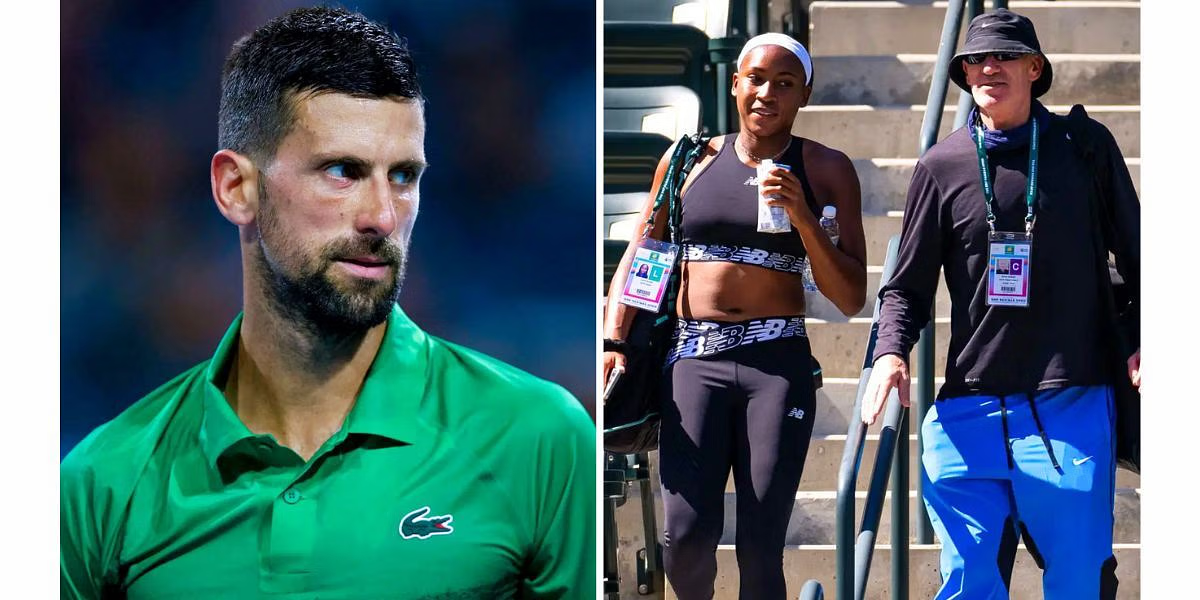
Novak Djokovic, the 37-year-old Serbian titan with 24 Grand Slam titles, faced an unexpected setback at the 2025 Madrid Open, falling in straight sets to Italy’s Matteo Arnaldi in the second round on April 26. The 6-3, 6-4 defeat, marked by 32 unforced errors and a lackluster 40 percent second-serve win rate, was Djokovic’s third consecutive loss and his fourth first-round exit in five tournaments this year. As the tennis world reeled from the upset, Brad Gilbert, Coco Gauff’s former coach and a seasoned tennis analyst, delivered a succinct yet telling three-word verdict on social media: “Not good enough.” His blunt assessment of Djokovic’s performance sparked widespread discussion about the state of the Serbian’s game and what it means for his legacy as he chases a record-extending 100th career title.
Djokovic’s 2025 season has been a turbulent ride. After a promising Miami Open final, where he lost to 19-year-old Jakub Mensik, he suffered early exits in Monte-Carlo to Alejandro Tabilo and now Madrid. The Arnaldi match exposed vulnerabilities rarely seen in Djokovic’s storied career. Despite a first-round bye, he struggled to find rhythm, with Arnaldi capitalizing on his errors to secure a career-defining victory. “I lost to a better player,” Djokovic admitted post-match, a rare concession from a player who has dominated for two decades. Gilbert’s comment, shared on X, cut to the core of the issue, reflecting a growing sentiment that Djokovic’s current form falls short of his own lofty standards.
The Madrid loss was particularly jarring given Djokovic’s history at the tournament, where he clinched titles in 2011, 2016, and 2019. His decision to return after skipping the event in 2023 and 2024 was seen as a statement of intent, especially with Andy Murray, his new coach and former rival, in his corner. The Djokovic-Murray partnership, announced in late 2024, has drawn intrigue, with Gilbert previously praising it as a “good move.” However, the early results have been mixed, with Djokovic’s semifinal withdrawal at the Australian Open due to a hamstring injury setting a challenging tone. “This level of tennis is not where I would like it to be,” Djokovic said in Madrid, acknowledging the mental strain of his recent string of early exits. “For 20 years, I didn’t experience what I’m experiencing in the last 12 months. It’s a completely different feeling.”
Gilbert, who coached Gauff to her 2023 US Open title, is no stranger to analyzing elite performers. His work with Andre Agassi, Andy Roddick, and Andy Murray gives his critique weight. His three-word verdict wasn’t just about one match but a broader commentary on Djokovic’s struggle to adapt to a new phase of his career. At 37, Djokovic faces younger, fearless opponents like Arnaldi, who grew up idolizing him. “He’s my idol, he’s always been,” Arnaldi said, yet he played with the audacity to break Djokovic at 4-3 in the second set, sealing the upset. Gilbert’s post also highlighted the rise of players like Tabilo, Luciano Darderi, and Flavio Cobolli, all under 25, who won titles the previous week, signaling a generational shift.
Djokovic’s reflections in Madrid were tinged with uncertainty. When asked if he’d return to the tournament, he replied, “It could be. I’m not sure if I will come back. I hope it’s not, but it could be.” His focus now shifts to Roland Garros, where he aims to reclaim his form. “I’m not going into Roland Garros as one of the main favorites. Maybe that can help,” he said, hinting that reduced pressure might spark a resurgence. Gilbert’s critique, while harsh, aligns with Djokovic’s own acknowledgment of needing to elevate his game.
The tennis community remains divided. Some, like Coco Gauff, still view Djokovic as “the greatest tennis player” and a Roland Garros favorite, while others see his recent losses as evidence of decline. As Djokovic prepares for Rome and the French Open, Gilbert’s words linger as a challenge: to rediscover the brilliance that defined his era. Whether this Madrid exit is a blip or a sign of things to come, Djokovic’s resolve and Murray’s guidance will be tested in the clay season ahead.
Leave a Reply